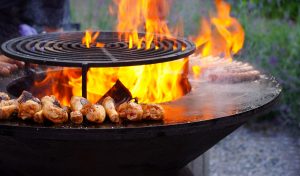This summer, too, the garden is the centre of life for many people. People are increasingly grilling outdoors instead of cooking indoors. But cooking and roasting with charcoal or gas barbecues involves risks that should not be underestimated and of which one should be aware.
According to surveys by burns doctors, there are around 4,000 barbecue accidents in Germany every year. This does not even require an open flame – high temperatures in combination with splashing fat are often enough to cause fires, especially if there are fat trays in the barbecue.
By the way: Burning fat must never be extinguished with water! As the water evaporates abruptly, a devastating fat fire explosion occurs. To suffocate a grease fire, the air supply must be cut off. For example, cover the fire with a metal lid or close the barbecue. In the case of gas barbecues, turn off the gas cylinder immediately. For all those who barbecue regularly or a lot, it may be useful to purchase a special grease fire extinguisher. These are also used in the catering industry.

Tips for safe barbecuing:
- When buying a barbecue, look for the GS mark the mark (Tested Safety).
- Gas barbecues should be checked for leaks at the beginning of the season. This can be done with special sprays or soapy water, wetting all lines. Small gas bubbles indicate leaks.
- Whether gas or coal – before the barbecue is lit, it is essential to ensure that it stands securely and is at a sufficient distance from plants, furniture, etc. (approx. 2 m). (approx. 2m). Never place the barbecue under pavilions, tents or parasols, as these could easily catch fire from flying sparks. Once it is hot, do not move or relocate it.
- When lighting the charcoal, only use solid or specially approved liquid burning aids. Never use fire accelerants such as methylated spirits or petrol! And never pour liquid barbecue lighters into the open flames. This can result in deflagrations, several metres high flames and serious burn injuries!
- Children should generally be kept away from the barbecue and hot embers.
- When barbecuing, wear only flame-retardant or normally flammable clothing and never clothing made of synthetic fibres.
- Extinguish the barbecue ashes with water or sand. It is best to let the embers cool down in the barbecue.
- Never leave a fireplace unattended. However, if a fire does start, a functioning fire extinguisher should be at hand. The way it works is simple: pull the safety catch, press the strike button or lever, depending on the model, and direct the extinguishing jet at the source of the fire with short, targeted blasts. Alternatively, always keep a bucket of water, sand, fire extinguisher or fire blanket handy.
